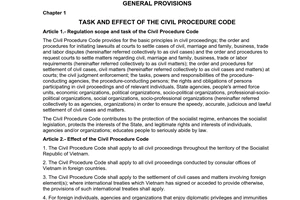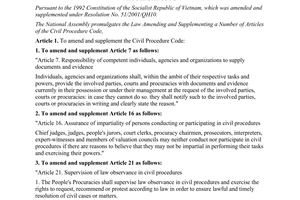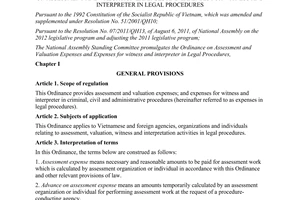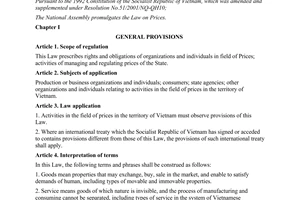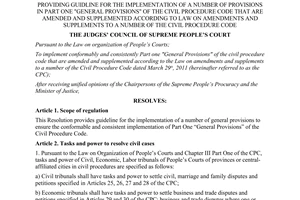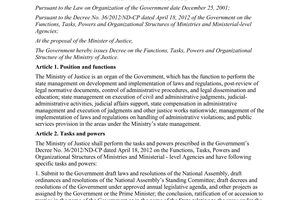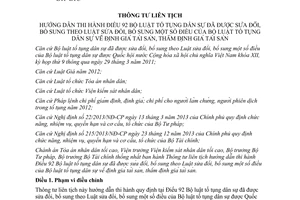Nội dung toàn văn Joint Circular No. 02/2014/TTLT-TANDTC-VKSNDTC-BTP-BTC guidelines 92 amended Civil procedure Code
|
THE PEOPLE’S SUPREME COURT – THE
PEOPLE’S SUPREME PROCURACY – THE MINISTRY OF JUSTICE – THE MINISTRY OF
FINANCE |
SOCIALIST REPUBLIC OF VIETNAM |
|
Hanoi, March 28, 2014 |
JOINT CIRCULAR
ON GUIDELINES FOR ARTICLE 92 OF THE AMENDED CIVIL PROCEDURE CODE ON ASSET PRICING AND ASSET VALUATION
Pursuant to the amended Civil Procedure Code passed by the XII National Assembly of the Socialist Republic of Vietnam at its session 9 dated March 19, 2011;
Pursuant to the Law on prices dated 2012;
Pursuant to the Law on organization of the People’s Court;
Pursuant to the Law on organization of People’s Procuracy;
Pursuant to the Ordinance on assessment and valuation; and expenditures on witnesses and interpreters in legal procedures dated 2012;
Pursuant to the Government’s Decree No. 22/2013/NĐ-CP dated March 13, 2013 defining the functions, tasks, entitlements and organizational structure of the Ministry of Justice;
Pursuant to the Government’s Decree No. 215/2013/NĐ-CP dated December 23, 2013 defining the functions, tasks, entitlements and organizational structure of the Ministry of Finance;
The Executive judge of the People’s Supreme Court, the Chief Procurator of the Supreme People’s Procuracy, the Minister of Justice and the Minister of Finance unanimously issue a Joint Circular on guidelines for Article 92 of amended Civil Procedure Code on asset pricing and asset valuation.
Article 1. Scope
This Joint Circular promulgates guidelines for Article 92 of amended Civil Procedure Code passed by XII National Assembly of Socialist Republic of Vietnam at its session 9 dated March 29, 2011 (hereinafter referred to as CPC) on asset pricing and asset valuation.
Article 2. Rules for asset pricing
1. Litigants shall reach an agreement on asset pricing, selection of pricing organization. The State shall respect the agreement between litigants on asset pricing, selection of pricing organization as prescribed, unless they collude together or with the pricing organization in giving a low price to evade their obligations to the State.
2. The asset pricing shall be carried out according to technical standards, status of assets; in conformity with market prices where the asset is located at the pricing time.
3. The honesty, objectivity, public and adherence to regulations of law must be ensured.
4. Asset prices shall be determined in Vietnam dong (VND).
5. In case the to-be-priced asset does not exist, the asset pricing shall be carried out according to dossier on civil lawsuit or prices of the identical assets or assets having the similar function or technical standards. The identical asset or asset having similar function or technical standards shall be determined as prescribed in regulations of law.
Article 3. Agreements on asset pricing
An agreement on pricing of asset under dispute must meet all requirements below:
1. The contracting parties of the agreement on asset pricing must be litigants or representatives of litigants;
2. The contracting parties voluntarily conclude the agreement;
3. The agreement complies with Article 2 of this Joint Circular;
4. The agreement must be made in writing with signatures of contracting parties.
Article 4. Agreements on appointment of asset valuation organization
An agreement on appointment of asset valuation organization concluded by litigants must meet all requirements below:
1. The agreement must comply with Article 3 of this Joint Circular.
2. The appointed asset valuation organization must be eligible for operation as prescribed in law on valuation.
Article 5. Requirements pertaining to asset valuation organizations
1. If all litigants require the Court to appoint an asset valuation organization, the name of organization must be clarified. Within 10 working days, from the date on which the written request of litigants is received, the Court shall appoint the asset valuation organization to carry out the valuation in writing.
2. If any litigant requires the Court to appoint an asset valuation organization, the Court shall notify other litigants in the civil lawsuits in writing. Within 15 working days, from the date on which the written request of the Court is received, if the litigants offer no opinion or they agree to the request, the Court shall appoint the asset valuation organization to carry out the valuation in writing. In case any litigant refuses the request, all litigants are entitled to request the Court to evaluate the asset as prescribed in Clause 1 Article 7 of this Joint Circular.
3. In case a litigant requires the Court to appoint the asset valuation organization to evaluate the asset under dispute as prescribed in Clause 1 and Clause 2 of this Article, it must be made in writing with signature of the requester and certification of eligibility for valuation services granted to the asset valuation organization as prescribed. The written request shall comply with the Form No. 1 issued together with this Circular.
Article 6. Procedures for litigants’ request for appointing asset valuation organization
1. When all requirements pertaining to the appointment of asset valuation organization prescribed in Article 5 of this Joint Circular are satisfied, the Court shall appoint the asset valuation organization in writing to evaluate the asset under dispute.
2. If the asset valuation organization agrees to the request in writing, the Court shall notify the litigants to follow procedures as the request of asset valuation organization as prescribed. If the request is rejected, the Court shall notify litigants in order for them to appoint another asset valuation organization.
3. The asset valuation organization shall carry out the valuation as prescribed in law on asset valuation.
4. When the result of valuation is produced, the asset valuation organization must send it to the Court. The Court shall notify the result of valuation to litigants in the asset valuation.
5. The result of valuation shall be considered as evidence if the asset valuation is carried in accordance with regulations of law.
Article 7. Judgment about asset pricing of the Court
1. The Court shall issue a judgment about asset pricing at the request of litigants.
The written request for issuance of a Judgment about pricing of asset under dispute shall comply with the Form No. 2 issued together with this Joint Circular.
2. The Court shall issue the Judgment about asset pricing without request of litigants if it is evident that the litigants collude together and with asset valuation organization to give low prices in order to evade their obligations.
Article 8. Procedures for establishment of Council in charge of asset pricing and issuance of decisions on asset pricing (hereinafter referred to as the Pricing council)
1. Before issuing the Judgment about pricing of asset under dispute, the Court shall determine to-be-priced asset, agencies in charge and number of members of Pricing council. Then the Court shall request the financial authority at the same level to appoint a representative to be the Chairman of the Pricing council, request other authorities to appoint officers having qualification in asset pricing to be members of the Pricing council. The request of the Court must clarify the to-be-priced asset, specific requirements regarding the Chairman and members of the Pricing council. Within 10 working days, from the date on which the request of the Court is received, the financial authority and other authorities must send responses to the Court. If it fails to send responses on schedule, they must provide explanation in writing.
2. After receiving the responses of the financial authority and other authorities, the Judge handling the case must check if the appointees are in the cases prescribed in Article 46 of the Civil Procedure Code and Article 13 of the Resolution No. 03/2012/NQ-HĐTP dated December 3, 2012 of Council of Judges of the People’s Supreme Court on guidelines for Part 1 “General provisions” of amended the Civil Procedure Code. If the appointees in the cases prescribed in the above regulations, the Court shall request the agency to appoint other people to participate in the Pricing council.
3. Within 05 working days, from the date on which the responses are received, the Court shall issue the Judgment about asset pricing. The Judgment about asset pricing shall use the Form No. 3 issued together with this Circular.
4. The Court shall appoint a Court clerk to help the Pricing council to record the process of asset pricing and perform tasks as prescribed in Point a Clause 2 Article 15 of this Joint Circular.
5. The Court may invite representatives of People’s Committee of communes, wards and towns (hereinafter referred to as communes) where the to-be-priced asset is located to participate as witnesses of the process of asset pricing conducted by the Pricing council as prescribed in Clause 2 Article 92 of the Civil Procedure Code where necessary.
Article 9. Sending Judgment about asset pricing
Within 03 working days, from the date on which the Judgment about asset pricing is issued, the Court shall send the Judgment about asset pricing and documents related to to-be-priced asset to members of the Pricing council, litigants and the People’s Committee of commune where the to-be-priced asset is located (if the representative of the People’s Committee is invited as a witness).
Article 10. Request for replacement and procedures for request for replacement for members of the Pricing council
1. Within 03 working days, from the date on which the Judgment about pricing of asset under dispute is received, litigants, individuals, agencies, or organizations are entitled to request the Court to replace members of the Pricing council directly or in writing.
If the litigants, individuals, agencies, or organizations directly request the Court to replace members of the Pricing council, that request must be recorded in dossiers on civil cases.
2. If the Court deems it is evident to replace members of the Pricing council, within 03 working days, from the date on which the request for replacement of members of the Pricing council is received, the Court shall request the authority in writing to appoint another person to participate in the Pricing council.
If the Court deems it is not evident to replace members of the Pricing council, within 03 working days, from the date on which the request for replacement of members of the Pricing council is received, the Court shall notify the litigants, individuals, agencies, or organizations of the rejection.
3. The Judgment about replacement of members of the Pricing council shall comply with the Form No. 4 issued together with this Circular.
Article 11. Rights and obligations of the Pricing council
The Pricing council shall have rights to:
a) Request individuals, agencies, or organizations to provide documents or information about to-be-priced asset; provide documents on status and remaining quality rate of the asset;
b) Request the Court to hire necessary services to carry out the asset pricing;
c) Other rights as prescribed.
The Pricing council shall have obligations to:
a) Conform to rules, methods, procedures for asset pricing as prescribed and guidance in this Joint Circular;
b) Carry out the asset pricing on schedule mentioned in the Judgment about asset pricing. If the asset pricing is not carried out on schedule mentioned in the Judgment about asset pricing, at least 03 working days before the deadline mentioned in the Judgment, the Chairman of the Pricing council must notify the Court in order for the Court to change the pricing time;
c) Reach a conclusion on value of to-be-priced asset and take responsibility for that conclusion;
d) Other rights as prescribed.
Article 12. Rights and obligations of the members of Pricing council
1. The members of Pricing council shall have rights to:
a) Receive Judgment about asset pricing;
b) Offer opinions about characteristics of to-be–priced asset; about basis, pricing methods and value of the to-be-priced asset;
c) Vote on the value of the to-be-priced asset;
d) Receive notification of content, attendants, time, place of asset pricing meeting and relevant information;
dd) Other rights as prescribed.
2. The members of the Pricing council shall have obligations to:
a) Perform tasks mentioned in the Judgment about asset pricing and assignment given by the Chairman of the Pricing council;
b) Regularly attend the asset pricing meeting, on time and in right place stated in the Judgment about asset pricing or notification of change in pricing time issued by the Court;
c) Take responsibility for their evaluation and votes as prescribed in Point b, Point c Clause 1 of this Article;
dd) Other obligations as prescribed.
Article 13. Rights and obligations of litigants attending in the asset pricing meeting
1. When attending in the asset pricing meeting, the litigants have rights to:
a) Offer his/her opinions when the Chairman of the Pricing council permits;
b) Provide information or materials related to the to-be-priced asset under dispute.
2. The litigants have obligations to comply with regulations of law and this Joint Circular.
Article 14. Trust of asset pricing
If the to-be-priced asset is in an administrative division other than the place where the headquarter of the Civil court is located, the Court shall make a Decision on trust for asset pricing as prescribed in Article 93 of the Civil Procedure Code and guiding documents in order for another Court or competent agency where the asset is located to carry out the asset pricing.
Article 15. Procedures for meetings of the Pricing council
1. The Pricing council only hold the meeting if the meeting is fully attended.
2. A meeting of the Pricing council shall follow the procedures below:
a) The Court clerk appointed to help the Pricing council by the Court shall check the attendance according to the summons, notifications of the Court; if someone is absent, the reason must be clarified;
b) The Chairman of the Pricing council shall announce the Decision on pricing of asset under dispute;
c) The Pricing council shall carry out the pricing to every asset or every part of the asset;
d) Litigants shall offer their opinions about asset pricing when the Pricing council permits;
dd) The members of the Pricing council shall offer their opinions about asset pricing and the prices of to-be-priced asset;
e) The Pricing council shall give the price of asset for voting;
g) The Pricing council shall vote for asset prices.
The Decision on asset prices shall be passed if it is received at least 50% of affirmative votes from members of the Pricing council. In case the Decision is received 50% of affirmative votes and 50% of negative votes, the vote of the Chairman of the Pricing council shall be final.
3. The minutes of the meeting shall be taken by the Court clerk. The minutes shall comply with the form No. 05 issued together with this Joint Circular. The minutes must be signed by the members of the Pricing council, litigants, witnesses (if any) and the Court clerk.
4. After closing the meeting, the Pricing council shall transfer all dossiers on the asset pricing and the minutes to the Court to archive in the dossiers on civil lawsuits.
Article 16. Solutions for interference in asset pricing carried out by the Pricing council
In case the Pricing council is interfered, the Chairman of the Pricing council shall request the representatives of the People’s Committees of communes, wards and towns, police authorities and other competent agencies to support promptly. According to the nature and extent of the interference, the person interfering the Pricing council shall be dealt with as prescribed.
In case it fails to carry out the asset pricing, the Pricing council shall make a record of failure to carry out the asset pricing due to the interference and archive in the dossier on civil lawsuits. The minutes of failure to carry out the asset pricing shall comply with the form No. 06 issued together with this Joint Circular.
The price of to-be-priced asset in the above circumstance shall be determined as prescribed in Article 17 of this Joint Circular.
Article 17. Asset pricing in other cases
1. In case litigants fail to reach an agreement on asset pricing, but they do not request the Court to appoint an asset valuation organization or not request the Court to establish the Pricing council, the Court shall request the litigants to give the price of asset themselves provided that they not commit violations as prescribed in Clause 2, 3, and 4 Article 2 of this Joint Circular. Within 15 days, from the date on which the litigants receive the request of the Court, if they give a common price, it shall be the price of asset and it shall be approved by the Court. In case the litigants give different prices, the Court shall approve the average of the prices. If there is only one litigant give the price of the asset under dispute, the Court shall approve that price.
2. In case any litigant interferes the asset pricing carried out by the Pricing council, the Court shall request litigants not interfering to give the asset price, provided that they do not commit violations as prescribed in Clause 2, 3 and 4 Article 2 of this Joint Circular. Within 15 days, from the date on which the litigants receive the request of the Court, if the litigants give a common price without any interference, the Court shall approve that price as the asset price. In case the litigants not interfering give different prices, the Court shall approve the average of prices as the asset price. In case there is only one litigant not interfering gives the price and other litigants do not give the price of asset under dispute, the Court shall determine the price given by former litigant.
3. In case the litigants fails to give the asset prices as prescribed in Clause 1, Clause 2 of this Article or all litigants interfere the asset pricing or fail to pay the advance of asset pricing expenditures as prescribed, the Court shall settle the civil lawsuit following the common procedures according to the dossier on civil lawsuits.
4. After determining the asset prices as prescribed in Clause 1 and Clause 2 of this Article, if the litigants request the asset pricing again, the Court shall not carry the asset pricing again.
Article 18. Asset re-pricing
1. The Court shall make a Decision on asset re-pricing at the request of one or all litigants in the following cases:
a) It is evident that the result of asset pricing does not conform to market prices where the to-be-priced asset is located at the pricing time;
b) It is evident that the Pricing council carried out the pricing dishonestly and subjectively.
2. With regard to the case prescribed in Clause 1 of this Article, the Court in charge of civil lawsuit shall carry out the asset re-pricing. If the Appellate court which is settling out the civil lawsuit must carry out the asset re-pricing, the Appellate court may entrust the Trial court settled that lawsuit to re-price the asset.
3. The asset re-pricing shall be carried out by another the Pricing council. The establishment and regulations on Re-pricing council shall comply with regulations on Pricing council as prescribed in this Joint Circular.
Article 19. Asset appraisal or pricing expenditures
The asset appraisal expenditures shall comply with the Ordinance No. 02/2012/UBTVQH13 dated March 28, 2012 of Standing Committee of the National Assembly on assessment and valuation expenditures and expenditures for witnesses and interpreters in legal procedures.
Article 20. Effect
1. This Joint Circular shall take effect from June 1, 2014.
2. Regarding civil lawsuits handled by the Court before the effective date of this Joint Circular, but from the effective date, that lawsuits are judged in the trial court, appellate court or court of cassation, this Joint Circular shall be applied.
Article 21. Guidance on the Joint Circular
If there are difficulties arising during the implementation of this Joint Circular, the People’s Courts, the People’s Procuracies of local governments, agencies, organizations, and individuals should report to the Supreme People’s Court, the Supreme People’s Procuracy, the Ministry of Justice or the Ministry of Finance for consideration./.
|
PP. CHIEF PROCURATOR OF
|
KT. EXECUTIVE JUDGE OF |
|
PP. THE MINISTER OF JUSTICE |
PP. THE MINISTER OF FINANCE |
------------------------------------------------------------------------------------------------------
This translation is made by LawSoft and
for reference purposes only. Its copyright is owned by LawSoft
and protected under Clause 2, Article 14 of the Law on Intellectual Property.Your comments are always welcomed


